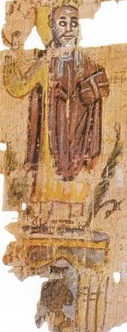Pope Theophilus of Alexandria
|
Saint Theophilus of Alexandria |
|
|---|---|
| Pope of Alexandria and Patriarch of the See of St. Mark | |

Theophilus atop the Serapeum
|
|
| Papacy began | 384 |
| Papacy ended | 15 October 412 |
| Predecessor | Timothy I |
| Successor | Cyril "Pillar of Faith" |
| Personal details | |
| Born | Egypt |
| Died | 15 October 412 Egypt |
| Buried | Dominicium, Alexandria |
| Nationality | Egyptian |
| Denomination | Coptic Orthodox Christian |
| Residence | Saint Mark's Church |
| Sainthood | |
| Feast day | 18 Paopi (Coptic Calendar) 15 October (Julian Calendar) Currently 28 October (Gregorian Calendar) until 2099 |
Theophilus of Alexandria was the 23rd Pope of Alexandria and Patriarch of the See of St. Mark. He became Pope at a time of conflict between the newly dominant Christians and the pagan establishment in Alexandria, each of which was supported by a segment of the Alexandrian populace. Edward Gibbon described him as "...the perpetual enemy of peace and virtue, a bold, bad man, whose hands were alternately polluted with gold and with blood."
In 391, Theophilus (according to Rufinus and Sozomen) discovered a hidden pagan temple. He and his followers mockingly displayed the pagan artifacts to the public which offended the pagans enough to provoke an attack on the Christians. The Christian faction counter-attacked, forcing the pagans to retreat to the Serapeum. A letter was sent by the emperor that Theophilus should grant the offending pagans pardon, but destroy the temple; according to Socrates Scholasticus, a contemporary of his, the latter aspect (the destruction of the temple) was added as a result of heavy solicitation for it by Theophilus.
Scholasticus goes on to state that:
The destruction of the Serapeum was seen by many ancient and modern authors as representative of the triumph of Christianity over other religions. According to John of Nikiu in the 7th century, when the philosopher Hypatia was lynched and flayed by a mob of Alexandrian Coptic monks, they acclaimed Theophilus's nephew and successor Cyril as "the new Theophilus, for he had destroyed the last remains of idolatry in the city".
Theophilus turned on the followers of Origen after having supported them for a time. He switched his view of God from the incorporeal view of God held by Origen to the anthropomorphic view held by many local monks who were hostile to his pastoral letter of 399.
He was accompanied by his nephew Cyril to Constantinople in 403 and there presided at the "Synod of the Oak" that deposed John Chrysostom.
...
Wikipedia
